Rwanda Tourism offers a unique and transformative travel experience, and SIXT.VN is here to ensure your journey is seamless and unforgettable. Discover the beauty of Rwanda with our expert travel tips, convenient airport transfers, comfortable hotel bookings, and curated tour packages. Let SIXT.VN be your guide to exploring the wonders of this captivating destination, with reliable transport, accommodation and unforgettable tours.
1. What Makes Rwanda a Unique Tourist Destination?
Rwanda tourism stands out due to its stunning landscapes, rich culture, and remarkable transformation. The country offers a blend of natural beauty and historical significance that attracts a diverse range of travelers.
Rwanda, often called the “Land of a Thousand Hills,” boasts lush, green landscapes that provide a visually stunning backdrop for any trip. According to the Rwanda Development Board, tourism is a key pillar of the nation’s economy, contributing significantly to its GDP and providing employment opportunities for many Rwandans. This commitment to tourism is evident in the well-maintained infrastructure and the focus on sustainable tourism practices. Rwanda’s natural beauty, combined with its commitment to conservation, makes it a unique and compelling destination for travelers seeking meaningful experiences.
The country’s history, marked by the 1994 genocide, is a powerful testament to resilience and reconciliation. Visiting the memorial sites provides a deep, emotional connection to the country and its people. This combination of natural beauty and historical depth makes Rwanda tourism a unique and enriching experience.
2. What Are the Top Attractions for Rwanda Tourism?
Rwanda boasts several must-see attractions that cater to different interests, including Volcanoes National Park, Akagera National Park, and cultural sites such as the Genocide Memorials.
- Volcanoes National Park: This is arguably Rwanda’s most famous attraction, home to the endangered mountain gorillas. Gorilla trekking is a once-in-a-lifetime experience, allowing visitors to observe these magnificent creatures in their natural habitat. Permits can be expensive, but many find the encounter invaluable.
- Akagera National Park: For those interested in wildlife beyond gorillas, Akagera offers classic African safari experiences. Here, you can see lions, elephants, giraffes, and a variety of bird species. The park has undergone significant rehabilitation, making it a success story in conservation efforts.
- Nyungwe Forest National Park: This park is one of the oldest rainforests in Africa and offers incredible biodiversity. Visitors can enjoy chimpanzee trekking, canopy walks, and numerous hiking trails through the dense forest.
Beyond these natural attractions, Rwanda’s cultural sites provide insight into the country’s history and recovery. The Kigali Genocide Memorial is a poignant reminder of the 1994 tragedy and a tribute to the resilience of the Rwandan people. Exploring local markets and craft cooperatives also offers a chance to engage with Rwandan culture and support local communities.
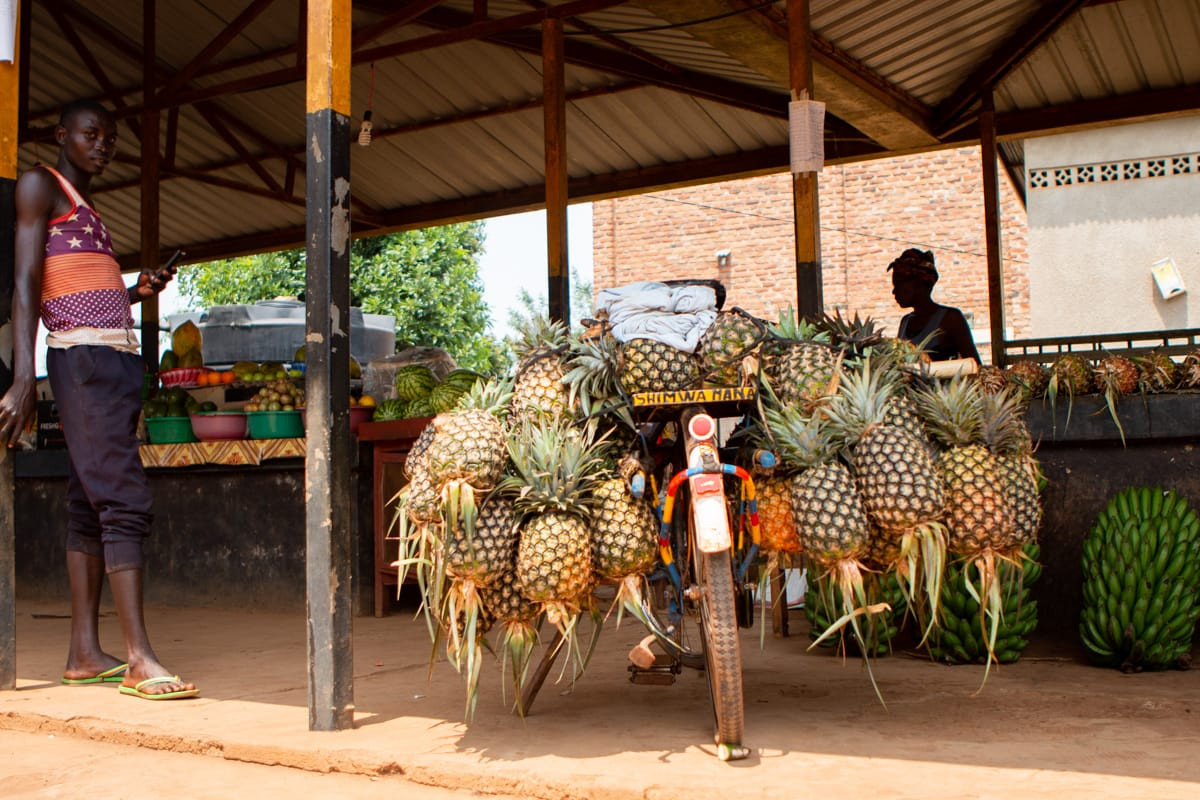 Pineapple delivery at a roadside produce market
Pineapple delivery at a roadside produce market
3. What Should Travelers Know About Gorilla Trekking in Rwanda?
Gorilla trekking in Rwanda is a highly regulated activity with strict rules to protect the gorillas and ensure a safe experience for tourists. Understanding these guidelines is essential for a responsible and enjoyable trek.
Permits are required to participate in gorilla trekking and must be booked well in advance. The Rwandan government limits the number of permits available each day to minimize disturbance to the gorilla families. According to the Rwanda Development Board, permits can cost around $1,500 USD per person. The high cost reflects the commitment to conservation and the need to fund ongoing protection efforts.
Treks are led by experienced guides who provide information about the gorillas and their habitat. These guides ensure that visitors adhere to the rules, such as maintaining a safe distance from the gorillas and avoiding direct contact. Trekkers should be prepared for a challenging hike, as the terrain can be steep and muddy. It is important to wear appropriate clothing, including sturdy hiking boots, long pants, and long-sleeved shirts, to protect against vegetation and insects.
4. What Are the Best Times to Visit Rwanda for Rwanda Tourism?
The best times to visit Rwanda are during the dry seasons, from June to September and December to February. These months offer the most favorable weather conditions for outdoor activities and wildlife viewing.
During the dry seasons, rainfall is minimal, making it easier to trek through national parks and enjoy safari experiences. The clear skies also provide better visibility for wildlife spotting and landscape photography. However, these months are also the peak tourist season, so it’s essential to book accommodations and activities in advance.
The wet seasons, from March to May and October to November, can still be enjoyable, but travelers should be prepared for rain. The rain can make hiking trails more challenging, but the lush landscapes are particularly vibrant during these months. Additionally, the wet seasons often see fewer tourists, which can mean lower prices and a more solitary experience.
5. What Cultural Experiences Can Tourists Enjoy in Rwanda?
Rwanda offers a variety of cultural experiences that provide insight into the country’s traditions, art, and history. These experiences range from visiting historical sites to participating in local community activities.
- Kigali Genocide Memorial: This is a must-visit site for understanding Rwanda’s recent history and paying respect to the victims of the genocide. The memorial includes exhibits, gardens, and a burial ground.
- Inema Arts Centre: This art center in Kigali showcases contemporary Rwandan art. Visitors can meet the artists, view their works, and even participate in workshops.
- National Museum of Rwanda: Located in Huye, this museum provides a comprehensive overview of Rwandan history, culture, and natural heritage.
- Community Tourism: Several organizations offer community-based tourism experiences, allowing visitors to engage with local communities and support their livelihoods. Activities may include visiting farms, learning traditional crafts, and participating in cultural performances.
According to a report by the United Nations World Tourism Organization, cultural tourism is increasingly important for sustainable development, as it helps preserve cultural heritage and provide economic benefits to local communities. By participating in these cultural experiences, tourists contribute to the preservation of Rwandan traditions and support the country’s development.
 Kim drinking coffee from Imigongo Art Cafe
Kim drinking coffee from Imigongo Art Cafe
6. What Are the Best Options for Accommodation During Rwanda Tourism?
Rwanda offers a range of accommodation options to suit different budgets and preferences, from luxury hotels to budget-friendly guesthouses. Here are some of the best options:
- Luxury Hotels: Kigali is home to several high-end hotels, such as the Hotel des Mille Collines and the Radisson Blu Hotel. These hotels offer top-notch amenities, including swimming pools, fine dining restaurants, and spa services.
- Mid-Range Hotels: Throughout Rwanda, you can find comfortable mid-range hotels that offer a balance of quality and affordability. These hotels often provide amenities such as Wi-Fi, breakfast, and comfortable rooms.
- Guesthouses and Lodges: For a more authentic experience, consider staying at a guesthouse or lodge. These accommodations are often family-run and offer a more intimate atmosphere. They can be found in various locations, including near national parks and in rural areas.
- Eco-Lodges: Rwanda is committed to sustainable tourism, and there are several eco-lodges that focus on minimizing their environmental impact. These lodges often offer unique experiences, such as nature walks and bird watching.
According to Booking.com, Kigali is a popular choice for travelers due to its central location and wide range of accommodation options. However, other cities and regions also offer excellent choices, depending on your itinerary.
7. What Are the Transportation Options for Getting Around Rwanda?
Getting around Rwanda is relatively easy, with several transportation options available. Understanding these options can help you plan your itinerary and travel efficiently.
- Car Rental: Renting a car is a popular choice for travelers who want flexibility and independence. Several international and local car rental companies operate in Rwanda. However, it’s important to note that roads can be challenging in some areas, so a 4×4 vehicle is recommended.
- Taxis: Taxis are available in Kigali and other major cities. They can be a convenient option for short trips, but it’s important to negotiate the fare before starting your journey.
- Motorcycle Taxis: Known as “moto-taxis,” these are a common mode of transportation in Rwanda. They are affordable and can navigate through traffic easily. However, safety can be a concern, so it’s important to wear a helmet.
- Buses: Buses are the most affordable way to travel between cities and towns in Rwanda. Several bus companies operate throughout the country, offering regular service on major routes.
- Private Transfers: For a more comfortable and convenient option, consider booking a private transfer. This can be arranged through your hotel or a tour operator. SIXT.VN offers reliable and efficient airport transfer and private car services to ensure seamless travel across Rwanda.
According to a report by the World Bank, Rwanda has invested heavily in its transportation infrastructure in recent years, which has improved connectivity and reduced travel times.
8. What Food and Drink Should Tourists Try in Rwanda?
Rwandan cuisine offers a variety of flavors and dishes that reflect the country’s agricultural heritage. Here are some must-try food and drink items:
- Ugali: This is a staple dish made from maize flour and water. It’s often served with stews or grilled meat.
- Ibiharage: This dish consists of beans cooked with onions, tomatoes, and spices. It’s a hearty and nutritious meal.
- Brochettes: These are grilled skewers of meat, typically goat or beef. They are a popular street food item.
- Isombe: Made from mashed cassava leaves, this dish is often cooked with vegetables and served with rice or potatoes.
- Rwandan Coffee: As mentioned earlier, Rwanda produces some of the best coffee in the world. Be sure to try a cup of locally grown and roasted coffee.
- Ubwuki: This is a traditional honey beer that is often consumed during special occasions.
While Rwandan food may not be as widely known as other African cuisines, it offers a unique and flavorful culinary experience. Supporting local restaurants and markets is a great way to engage with Rwandan culture and contribute to the local economy.
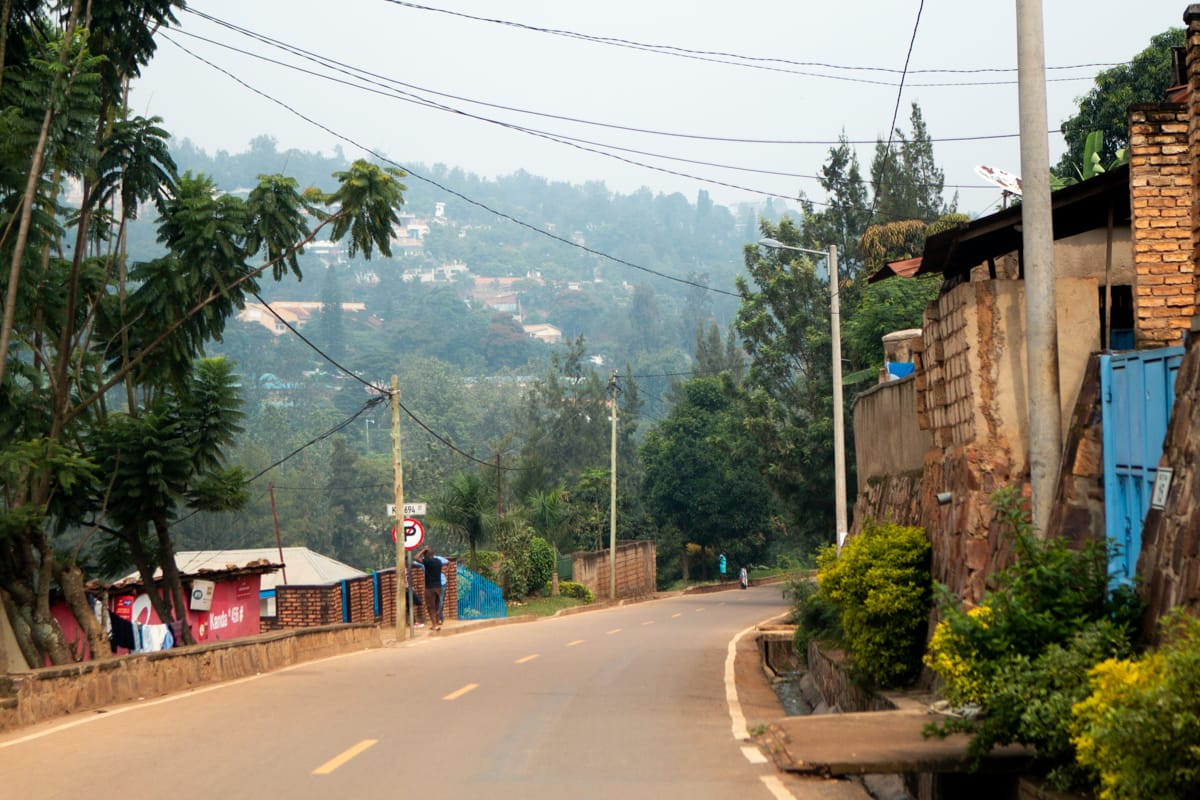 Clean rural street in Kigali
Clean rural street in Kigali
9. What Are Some Travel Tips for First-Time Visitors to Rwanda?
Visiting Rwanda for the first time can be an exciting experience, but it’s important to be prepared. Here are some essential travel tips:
- Visa Requirements: Check the visa requirements for your nationality before traveling to Rwanda. Many countries can obtain a visa on arrival, but it’s always best to confirm in advance.
- Health Precautions: Consult your doctor about recommended vaccinations and health precautions for Rwanda. Malaria is a risk, so it’s important to take preventative measures.
- Currency: The currency in Rwanda is the Rwandan Franc (RWF). Credit cards are accepted in some establishments, but it’s a good idea to carry cash for smaller businesses and rural areas.
- Language: The official languages are Kinyarwanda, English, and French. While English is widely spoken in tourist areas, learning a few basic phrases in Kinyarwanda can be appreciated by locals.
- Safety: Rwanda is generally a safe country for tourists. However, it’s always important to take precautions, such as avoiding walking alone at night and keeping your valuables secure.
- Cultural Sensitivity: Be respectful of Rwandan culture and traditions. Dress modestly when visiting religious sites and ask for permission before taking photos of people.
- Plastic Bag Ban: Rwanda has a strict plastic bag ban, so avoid bringing plastic bags into the country.
Following these travel tips will help ensure a smooth and enjoyable trip to Rwanda.
10. What Makes Rwanda Tourism a Responsible Choice?
Choosing Rwanda for your tourism destination can be a responsible choice due to the country’s commitment to sustainable development and conservation. By supporting tourism in Rwanda, you are contributing to these efforts.
Rwanda has implemented several initiatives to promote sustainable tourism, including:
- Conservation Efforts: The country has made significant investments in protecting its natural resources, including national parks and wildlife. Revenue from tourism is used to fund these conservation efforts.
- Community-Based Tourism: Many tourism initiatives in Rwanda focus on involving local communities and providing them with economic opportunities. This helps ensure that tourism benefits the people who live in and around tourist areas.
- Environmental Protection: Rwanda has implemented policies to protect the environment, such as the plastic bag ban and regulations on waste management.
- Ethical Tourism: Several organizations promote ethical tourism practices in Rwanda, encouraging travelers to support businesses that treat their employees fairly and respect local culture.
By choosing to visit Rwanda, you are supporting these efforts and contributing to the country’s sustainable development.
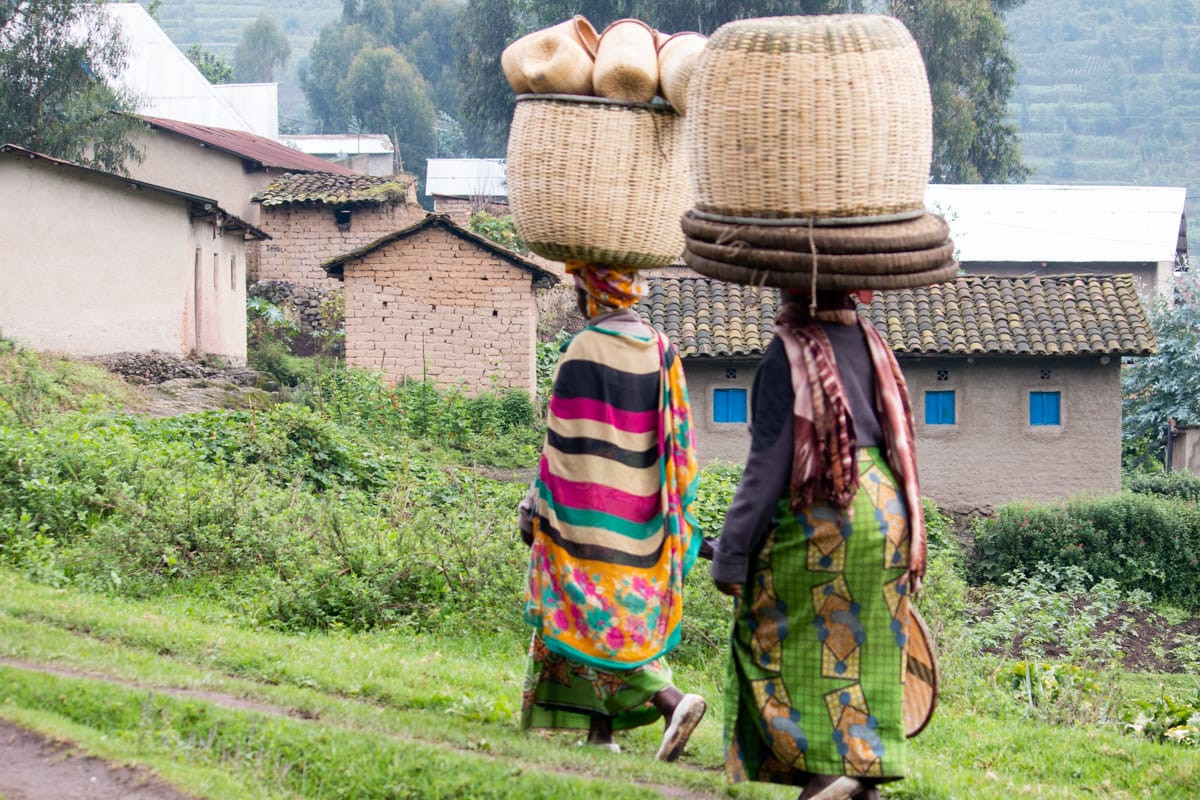 Rwandan women balancing baskets on their heads
Rwandan women balancing baskets on their heads
11. How Can SIXT.VN Enhance Your Rwanda Tourism Experience?
SIXT.VN offers a range of services designed to enhance your Rwanda tourism experience, including airport transfers, hotel bookings, and tour packages. Here’s how we can make your trip more convenient and enjoyable:
- Airport Transfers: Start your trip off right with a comfortable and reliable airport transfer from Kigali International Airport to your hotel. SIXT.VN provides efficient and professional airport transfer services, ensuring a seamless transition upon arrival.
- Hotel Bookings: Choose from a wide selection of hotels and accommodations in Rwanda through SIXT.VN. Whether you’re looking for a luxury hotel in Kigali or a cozy guesthouse in the countryside, we can help you find the perfect place to stay.
- Tour Packages: Explore Rwanda’s top attractions with our curated tour packages. From gorilla trekking in Volcanoes National Park to safari adventures in Akagera, we offer a variety of tours to suit different interests and budgets.
- Customized Itineraries: Our travel experts can create customized itineraries based on your preferences and interests. Whether you want to focus on wildlife, culture, or adventure, we can design a trip that’s perfect for you.
SIXT.VN is committed to providing high-quality service and ensuring that your trip to Rwanda is unforgettable. Contact us today to start planning your adventure.
12. What Safety Measures Should Tourists Be Aware Of in Rwanda?
Rwanda is generally considered a safe country for tourists, but it’s important to be aware of potential safety measures and take precautions to ensure a secure trip.
- General Safety: Rwanda has a relatively low crime rate compared to other countries in the region. However, petty theft can occur, especially in crowded areas. Keep your valuables secure and be aware of your surroundings.
- Road Safety: Road conditions can vary, and it’s important to drive carefully, especially in rural areas. Avoid driving at night and be cautious of pedestrians and animals on the road.
- Health Safety: Consult your doctor about recommended vaccinations and health precautions before traveling to Rwanda. Malaria is a risk, so it’s important to take preventative measures, such as using mosquito repellent and sleeping under a net.
- Political Stability: Rwanda is politically stable, but it’s always a good idea to stay informed about current events and follow the advice of local authorities.
- Emergency Services: In case of an emergency, dial 112 for the police, 111 for medical assistance, or 113 for fire services.
By taking these safety measures, you can have a secure and enjoyable trip to Rwanda.
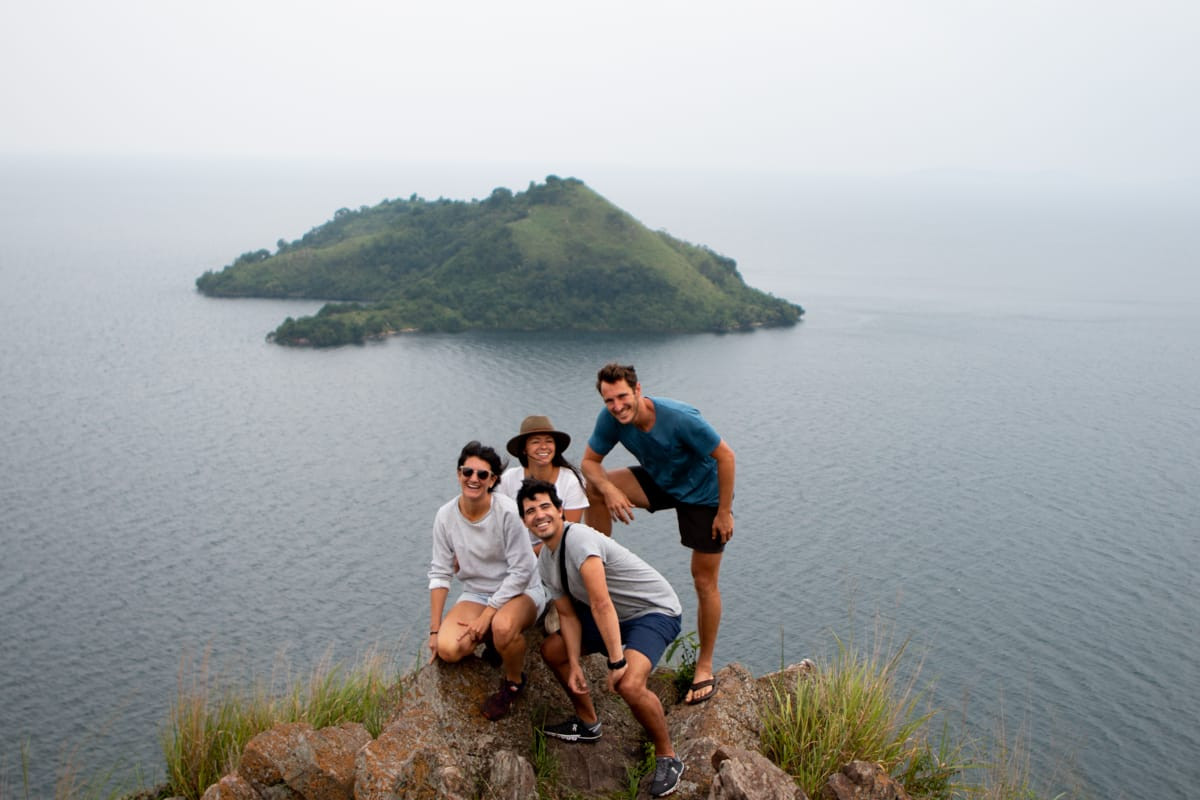 Hiking to the top of Napolean
Hiking to the top of Napolean
13. What Role Does Sustainable Tourism Play in Rwanda?
Sustainable tourism plays a crucial role in Rwanda’s development strategy. The country recognizes the importance of balancing economic growth with environmental protection and social responsibility.
- Economic Benefits: Tourism is a significant source of revenue for Rwanda, providing employment opportunities and supporting local businesses. Sustainable tourism practices help ensure that these economic benefits are long-term and equitable.
- Environmental Conservation: Rwanda has made significant investments in protecting its natural resources, including national parks and wildlife. Sustainable tourism practices help minimize the negative impact of tourism on the environment and support conservation efforts.
- Community Empowerment: Sustainable tourism initiatives often focus on involving local communities and providing them with economic opportunities. This helps ensure that tourism benefits the people who live in and around tourist areas.
- Cultural Preservation: Tourism can help preserve and promote Rwandan culture and traditions. Sustainable tourism practices encourage respect for local culture and support the preservation of cultural heritage.
According to the Rwanda Development Board, the country aims to become a leading sustainable tourism destination in Africa. This commitment is reflected in the policies and initiatives that promote responsible tourism practices.
14. What Are Some Lesser-Known Destinations Worth Visiting in Rwanda?
While Rwanda’s popular attractions like Volcanoes National Park and Akagera National Park are must-sees, the country also offers several lesser-known destinations that are worth exploring.
- Lake Muhazi: Located east of Kigali, Lake Muhazi is a beautiful lake surrounded by rolling hills and lush vegetation. It’s a great place for boating, fishing, and bird watching.
- Gishwati-Mukura National Park: This park is Rwanda’s newest national park, created to protect a biodiversity hotspot. It’s home to chimpanzees, golden monkeys, and a variety of bird species.
- Nyanza: This historic town was once the capital of the Kingdom of Rwanda. It’s home to the King’s Palace Museum, which provides insight into Rwandan history and culture.
- Lake Burera and Lake Ruhondo: These twin lakes are located near the border with Uganda. They offer stunning views and opportunities for hiking and kayaking.
- Huye: Known as the intellectual capital of Rwanda, Huye is home to the National Museum of Rwanda and several universities. It’s a great place to learn about Rwandan history and culture.
Exploring these lesser-known destinations can provide a more authentic and off-the-beaten-path experience in Rwanda.
15. How Does Rwanda Remember and Honor the Victims of the Genocide?
Rwanda has made significant efforts to remember and honor the victims of the 1994 genocide. Visiting memorial sites is an important part of understanding the country’s history and paying respect to the victims.
- Kigali Genocide Memorial: This is the most well-known memorial site in Rwanda. It includes exhibits, gardens, and a burial ground where over 250,000 victims are buried.
- Regional Memorial Sites: Several regional memorial sites are located throughout Rwanda, each commemorating the victims of the genocide in that area.
- Education and Remembrance: The Rwandan government has implemented educational programs to teach about the genocide and promote reconciliation. Remembrance ceremonies are held annually on April 7, the start date of the genocide.
- Survivor Support: Several organizations provide support to survivors of the genocide, including counseling, healthcare, and economic assistance.
Visiting these memorial sites can be a difficult but important experience. It’s a way to learn about the genocide, pay respect to the victims, and support the efforts to prevent such atrocities from happening again.
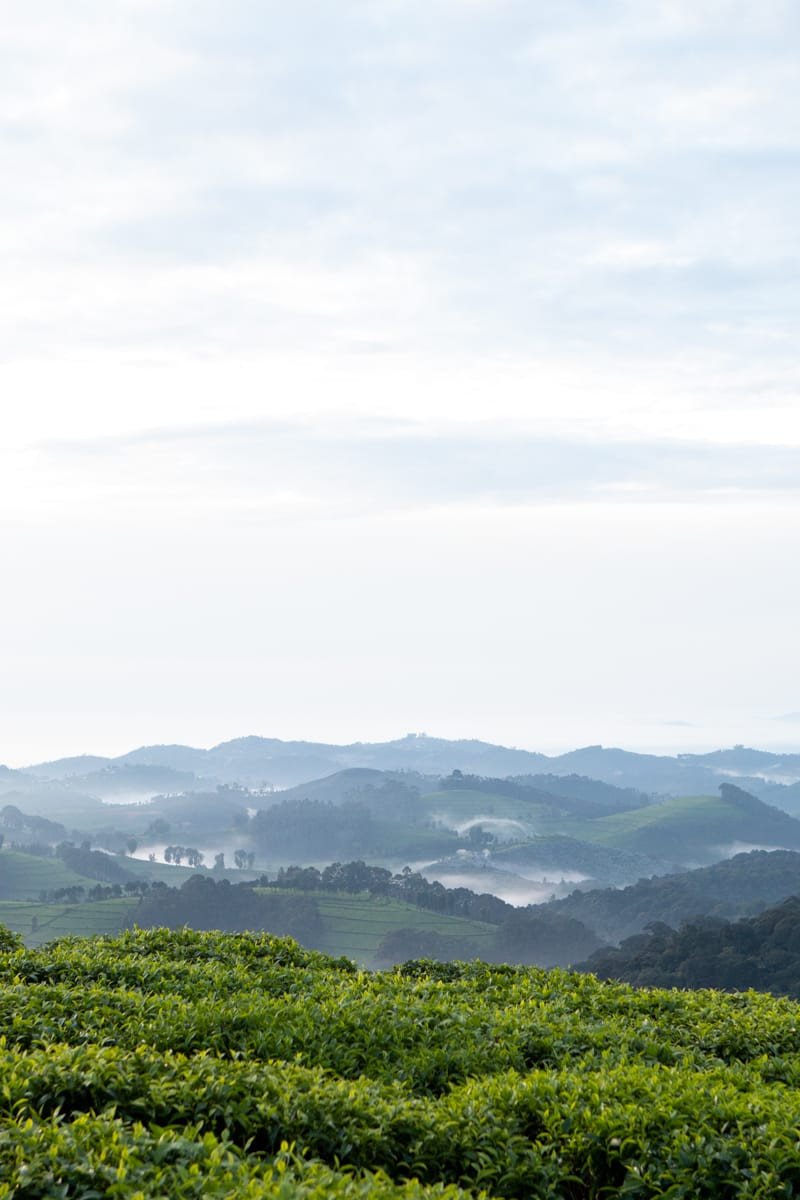 Sunrise views of Nyungwe forest and tea plantations from Kitabi Eco Lodge
Sunrise views of Nyungwe forest and tea plantations from Kitabi Eco Lodge
16. What Are Some Popular Activities Besides Gorilla Trekking in Rwanda?
While gorilla trekking is a major draw for Rwanda tourism, there are many other activities to enjoy in the country.
- Wildlife Safaris: Visit Akagera National Park for a classic African safari experience. See lions, elephants, giraffes, and a variety of bird species.
- Chimpanzee Trekking: Explore Nyungwe Forest National Park for chimpanzee trekking. It’s an incredible experience to observe these primates in their natural habitat.
- Canopy Walks: Also in Nyungwe Forest, take a canopy walk across a suspension bridge for stunning views of the forest.
- Hiking: Rwanda offers numerous hiking trails, from easy nature walks to challenging mountain climbs.
- Bird Watching: Rwanda is a birdwatcher’s paradise, with over 700 species of birds.
- Cultural Tours: Visit local markets, craft cooperatives, and historical sites to learn about Rwandan culture and history.
- Water Activities: Enjoy boating, fishing, and swimming on Lake Kivu and other lakes.
With so many activities to choose from, Rwanda offers something for every type of traveler.
17. How Does Rwanda Promote Eco-Friendly Tourism Practices?
Rwanda is committed to promoting eco-friendly tourism practices to minimize the impact of tourism on the environment and support sustainable development.
- National Park Management: Rwanda’s national parks are managed sustainably, with measures in place to protect wildlife and ecosystems.
- Eco-Lodges: Several eco-lodges in Rwanda focus on minimizing their environmental impact. These lodges often use renewable energy, conserve water, and support local communities.
- Plastic Bag Ban: Rwanda has a strict plastic bag ban, which helps reduce pollution and protect the environment.
- Community-Based Tourism: Tourism initiatives often focus on involving local communities and providing them with economic opportunities. This helps ensure that tourism benefits the people who live in and around tourist areas.
- Education and Awareness: The Rwandan government promotes education and awareness about environmental issues, encouraging both tourists and locals to adopt eco-friendly practices.
By promoting eco-friendly tourism practices, Rwanda is working to ensure that tourism benefits the environment and local communities.
18. What Events and Festivals Can Tourists Experience in Rwanda?
Rwanda hosts several events and festivals throughout the year that offer tourists a chance to experience Rwandan culture and traditions.
- Kwita Izina: This annual gorilla naming ceremony is a major event in Rwanda. It celebrates the conservation efforts to protect mountain gorillas and attracts visitors from around the world.
- Rwanda Film Festival: This festival showcases films from Rwanda and other African countries. It’s a great opportunity to see contemporary African cinema.
- Kigali Up: This music festival features local and international artists. It’s a celebration of Rwandan music and culture.
- National Liberation Day: Celebrated on July 4, this holiday commemorates the end of the Rwandan genocide. It includes parades, speeches, and cultural performances.
- Umuganura (National Harvest Day): Celebrated on the first Friday of August, this traditional holiday celebrates the harvest season and gives thanks for the bounty of the land.
Attending these events and festivals can provide a unique and enriching experience in Rwanda.
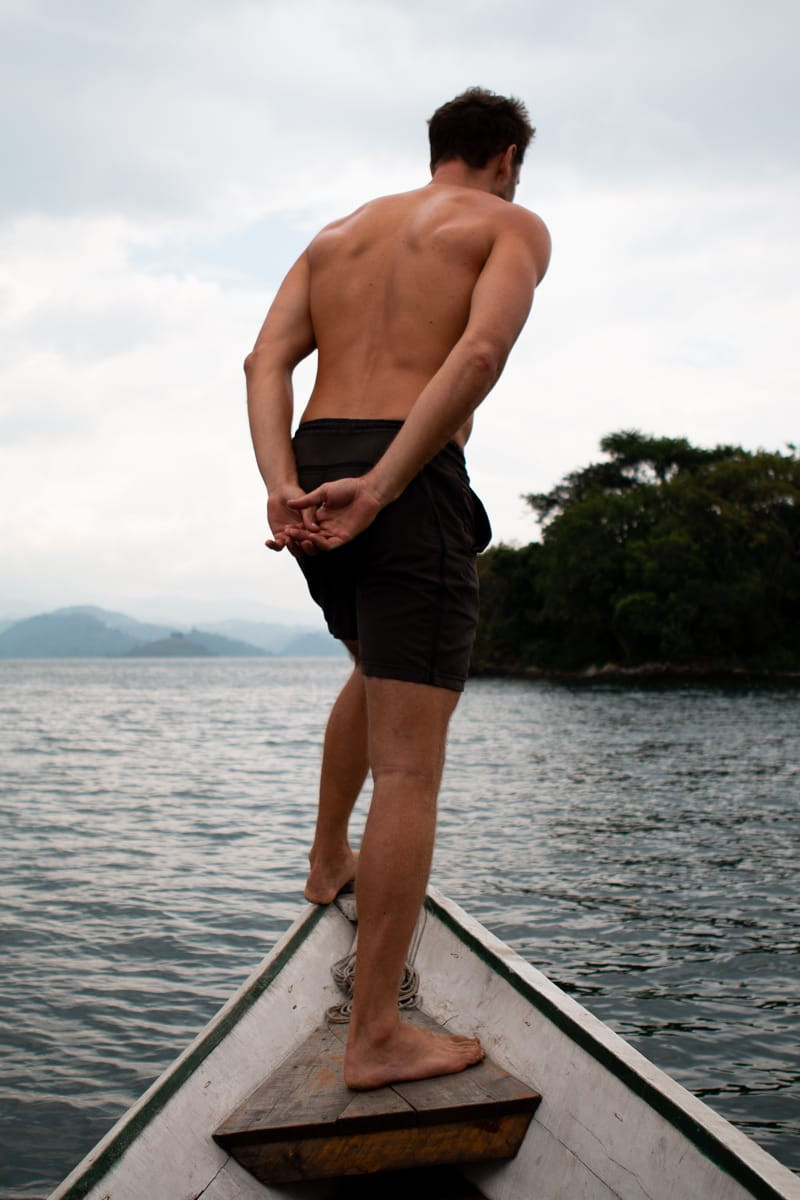 Chris peering over the boat on Lake Kivu
Chris peering over the boat on Lake Kivu
19. How Does Rwanda Address the Challenges of Its Past Through Tourism?
Rwanda has transformed its past challenges into opportunities for education and reconciliation through tourism. The country uses its history to promote understanding and prevent future atrocities.
- Genocide Memorials: The Kigali Genocide Memorial and other regional memorials serve as important sites for remembrance and education.
- Reconciliation Efforts: Rwanda has implemented programs to promote reconciliation between different groups in society. Tourism plays a role in these efforts by bringing people together and fostering understanding.
- Education and Awareness: The Rwandan government promotes education and awareness about the genocide, both domestically and internationally. Tourism helps raise awareness of the genocide and its lessons.
- Economic Development: Tourism provides economic opportunities for Rwandans, which can help reduce poverty and promote stability.
By addressing the challenges of its past through tourism, Rwanda is working to build a better future for all its citizens.
20. What Are Some Tips for Interacting Respectfully with Locals During Rwanda Tourism?
Interacting respectfully with locals is an important part of responsible tourism. Here are some tips for interacting respectfully with Rwandans:
- Learn a Few Basic Phrases: Learning a few basic phrases in Kinyarwanda can be appreciated by locals.
- Dress Modestly: Dress modestly, especially when visiting religious sites.
- Ask for Permission Before Taking Photos: Always ask for permission before taking photos of people.
- Be Respectful of Culture and Traditions: Be respectful of Rwandan culture and traditions. Avoid behavior that could be seen as disrespectful.
- Support Local Businesses: Support local businesses by buying local products and eating at local restaurants.
- Be Aware of Cultural Norms: Be aware of cultural norms and customs. For example, it’s customary to greet people with a handshake.
- Listen and Learn: Take the time to listen and learn from Rwandans. They can provide valuable insights into their culture and history.
By following these tips, you can interact respectfully with locals and have a more enriching travel experience in Rwanda.
Contact SIXT.VN Today!
Ready to experience the magic of Rwanda tourism? Let SIXT.VN take care of all your travel needs. From airport transfers to hotel bookings and tour packages, we offer everything you need for a seamless and unforgettable trip.
Address: 260 Cau Giay, Hanoi, Vietnam
Hotline/WhatsApp: +84 986 244 358
Website: SIXT.VN
Frequently Asked Questions (FAQs) About Rwanda Tourism
1. Is Rwanda safe for tourists?
Rwanda is generally considered a safe country for tourists. However, it’s always important to take precautions and be aware of your surroundings.
2. What is the best time to visit Rwanda?
The best times to visit Rwanda are during the dry seasons, from June to September and December to February.
3. Do I need a visa to visit Rwanda?
Many countries can obtain a visa on arrival, but it’s always best to check the visa requirements for your nationality before traveling to Rwanda.
4. What currency is used in Rwanda?
The currency in Rwanda is the Rwandan Franc (RWF).
5. What languages are spoken in Rwanda?
The official languages are Kinyarwanda, English, and French.
6. What should I pack for a trip to Rwanda?
Pack lightweight clothing, comfortable shoes, and insect repellent. If you plan to go gorilla trekking, bring sturdy hiking boots, long pants, and long-sleeved shirts.
7. Is gorilla trekking worth the cost?
Many people find gorilla trekking to be a once-in-a-lifetime experience that is worth the cost. However, it’s important to be prepared for a challenging hike.
8. What are some cultural norms I should be aware of in Rwanda?
Dress modestly, especially when visiting religious sites. Always ask for permission before taking photos of people.
9. How can I support sustainable tourism in Rwanda?
Support local businesses, stay at eco-lodges, and respect local culture and traditions.
10. What should I do in case of an emergency in Rwanda?
Dial 112 for the police, 111 for medical assistance, or 113 for fire services.
Plan your unforgettable Rwanda tourism adventure with SIXT.VN today and discover the heart of Africa!



